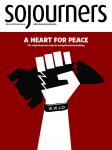DURING THE unseasonably warm autumn of 1951, 22-year-old Martin King Jr. began his doctoral work in systematic theology at Boston University. Wearing his good suit in a stifling classroom, he was first introduced to the work of philosopher and ethicist Josiah Royce. King read Royce's well-regarded 1913 book The Problem of Christianity and wrestled with Royce's metaphysical values of loyalty, communitarian ideals, and the role of the individual within a group.
But don't let the high academic or philosophical language fool you. Royce was interested in only one thing: Love. It was the hidden heart of all his endeavors. And King began to study—and embrace—Royce's most important philosophical concept: the Beloved Community.
Though Royce had first written about the Beloved Community nearly 40 years earlier, King heard it in the context of his own time and place. He heard it in the context of the insidious Jim Crow laws of the South. In 1951 he also heard it in the context of the bitter race realities of the North. The July before King started classes at Harvard, a race riot had erupted in Cicero, Illinois, outside Chicago. A mob of whites attacked an apartment building that housed one black family, that of Harvey Clark Jr., a WW II veteran and bus driver who had moved into the all-white neighborhood.
According to the Chicago Tribune, "In two nights of rioting, some 3,000 persons battled police and National Guardsmen. Twenty-three civilians, police, and Guardsmen were injured and 119 persons arrested." Buildings were burned. Mr. Clark and his family moved away.
If the Beloved Community was to be authentic, King knew, it must not only impel us to action but also carry our suffering. Would it stand up in situations like Cicero or Montgomery or Birmingham?
"A community," according to Royce, "is constituted by the fact that each of its members accepts as part of his or her own individual life the self-same past events." The Beloved Community not only says but intuitively feels that what happens to one of us, happens to all of us.
This spring marks the 50th anniversary of Dr. King's "Letter from a Birmingham Jail."
It was written in response to white ministers who urged civil rights leaders to follow the law and push for social change through the court system. They deplored the rising social violence in Alabama in 1963 and sought peace by appealing to the cool reason of the law. The demonstrations in Birmingham were, they said, "unwise and untimely."
King's epistle in response verges on sacred text: "We know through painful experience that freedom is never voluntarily given by the oppressor; it must be demanded by the oppressed. Frankly, I have yet to engage in a direct action campaign that was 'well timed' in the view of those who have not suffered unduly from the disease of segregation. For years now I have heard the word 'Wait!' It rings in the ear of every Negro with piercing familiarity. This 'Wait' has almost always meant 'Never.' We must come to see, with one of our distinguished jurists, that 'justice too long delayed is justice denied.'"
The incarnation of this press for freedom as a spiritually fueled social movement was understood by King to be the Beloved Community. It was not a utopian ideal and not Isaiah's vision of a peaceable kingdom, but instead a rough-and-tumble, realistic, achievable goal that could be attained through a critical mass of people who were committed to and trained in the philosophy and methods of nonviolence.
In our own era, we are also called to the Beloved Community and hear it in the context of our own times. "Let this life be your art," wrote Josiah Royce, "and also the art of all your fellow members. Let your community be as a chorus," he wrote, and not "as a company who forgets themselves in a common trance."

Got something to say about what you're reading? We value your feedback!